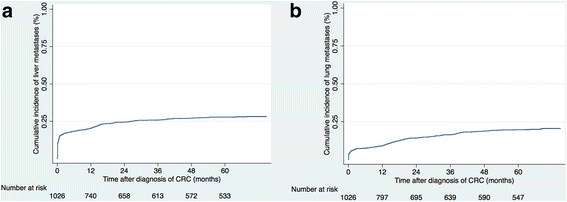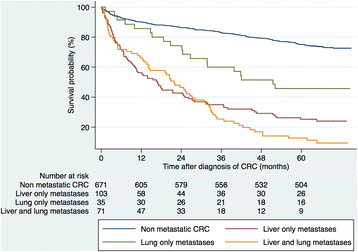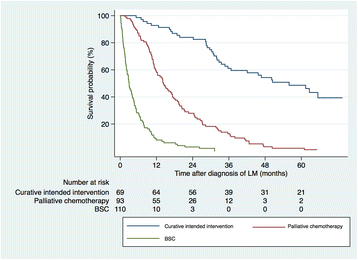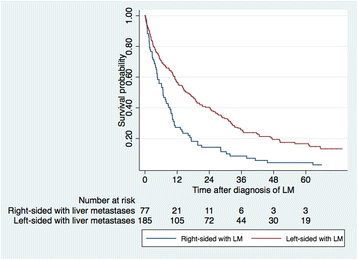Colorectal cancer liver metastases - a population-based study on incidence, management and survival
- PMID: 29334918
- PMCID: PMC5769309
- DOI: 10.1186/s12885-017-3925-x
Colorectal cancer liver metastases - a population-based study on incidence, management and survival
Abstract
Background: Colorectal cancer (CRC) is a leading cause of cancer-associated deaths with liver metastases developing in 25-30% of those affected. Previous data suggest a survival difference between right- and left-sided liver metastatic CRC, even though left-sided cancer has a higher incidence of liver metastases. The aim of the study was to describe the liver metastatic patterns and survival as a function of the characteristics of the primary tumour and different combinations of metastatic disease.
Methods: A retrospective population-based study was performed on a cohort of patients diagnosed with CRC in the region of Stockholm, Sweden during 2008. Patients were identified through the Swedish National Quality Registry for Colorectal Cancer Treatment (SCRCR) and additional information on intra- and extra-hepatic metastatic pattern and treatment were retrieved from electronic patient records. Patients were followed for 5 years or until death. Factors influencing overall survival (OS) were investigated by means of Cox regression. OS was compared using Kaplan-Meier estimations and the log-rank test.
Results: Liver metastases were diagnosed in 272/1026 (26.5%) patients within five years of diagnosis of the primary. Liver and lung metastases were more often diagnosed in left-sided colon cancer compared to right-sided cancer (28.4% versus 22.1%, p = 0.029 and 19.7% versus 13.2%, p = 0.010, respectively) but the extent of liver metastases were more extensive for right-sided cancer as compared to left-sided (p = 0.001). Liver metastatic left-sided cancer, including rectal cancer, was associated with a 44% decreased mortality risk compared to right-sided cancer (HR = 0.56, 95% CI: 0.39-0.79) with a 5-year OS of 16.6% versus 4.3% (p < 0.001). In liver metastatic CRC, the presence of lung metastases did not significantly influence OS as assessed by multivariate analysis (HR = 1.11, 95% CI: 0.80-1.53).
Conclusion: The worse survival in liver metastatic right-sided colon cancer could possibly be explained by the higher number of metastases, as well as more extensive segmental involvement compared with left-sided colon and rectal cancer, even though the latter had a higher incidence of liver metastases. Detailed population-based data on the metastatic pattern of CRC and survival could assist in more structured and individualized guidelines for follow-up of patients with CRC.
Keywords: Colorectal cancer; Extra-hepatic metastases; Left-sided cancer; Liver metastases; Right-sided cancer; Survival.
Conflict of interest statement
Ethics approval and consent to participate
Ethical approval for the study was obtained from the Regional Ethical Review Board in Stockholm. Because of the retrospective nature of the study, informed consent was waived.
Consent for publication
Not applicable
Competing interests
The authors declare that they have no competing interests.
Publisher’s Note
Springer Nature remains neutral with regard to jurisdictional claims in published maps and institutional affiliations.
Figures





References
-
- Adam R, De Gramont A, Figueras J, Guthrie A, Kokudo N, Kunstlinger F, Loyer E, Poston G, Rougier P, Rubbia-Brandt L, et al. The oncosurgery approach to managing liver metastases from colorectal cancer: a multidisciplinary international consensus. Oncologist. 2012;17(10):1225–1239. doi: 10.1634/theoncologist.2012-0121. - DOI - PMC - PubMed
-
- Manfredi S, Lepage C, Hatem C, Coatmeur O, Faivre J, Bouvier AM. Epidemiology and management of liver metastases from colorectal cancer. Ann Surg. 2006;244(2):254–259. doi: 10.1097/01.sla.0000217629.94941.cf. - DOI - PMC - PubMed
-
- House MG, Ito H, Gonen M, Fong Y, Allen PJ, DeMatteo RP, Brennan MF, Blumgart LH, Jarnagin WR, D'Angelica MI. Survival after hepatic resection for metastatic colorectal cancer: trends in outcomes for 1,600 patients during two decades at a single institution. J Am Coll Surg. 2010;210(5):744–752. doi: 10.1016/j.jamcollsurg.2009.12.040. - DOI - PubMed
Publication types
MeSH terms
Grants and funding
LinkOut - more resources
Full Text Sources
Other Literature Sources
Medical

